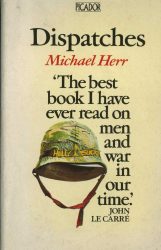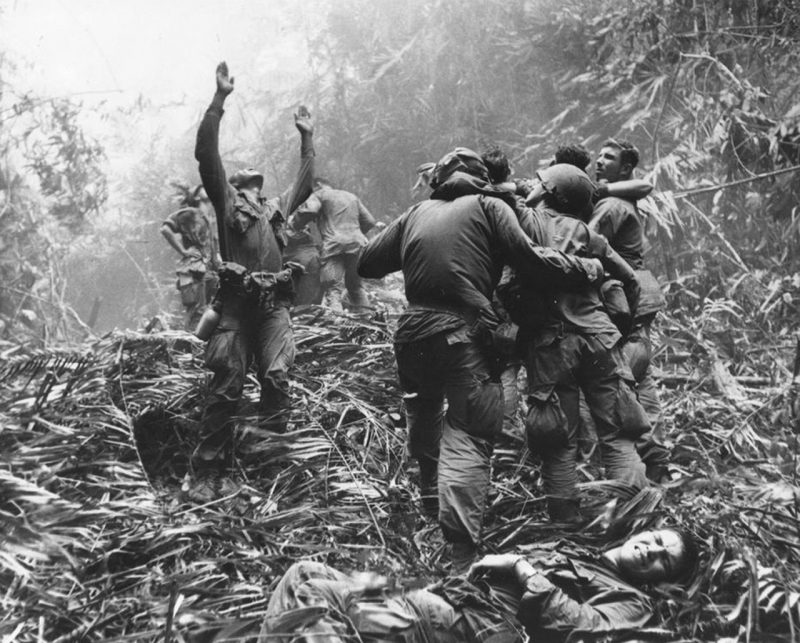A classic account of a defining American nightmare.
 The Vietnam war was a watershed event in recent American history and one that is beyond the experience of the corresponding generation in Britain who never had to face the draft in the same way. It was the first war that America lost (or didn’t win?) and it served to create a schism between large numbers of the populace and their government. Opposition was not the privilege of a bunch of long hairs and it brought together all sections of the community including, eventually, ex-servicemen. It showed that the government could be duplicitous and no respecter of international law. As Herr recalls,
The Vietnam war was a watershed event in recent American history and one that is beyond the experience of the corresponding generation in Britain who never had to face the draft in the same way. It was the first war that America lost (or didn’t win?) and it served to create a schism between large numbers of the populace and their government. Opposition was not the privilege of a bunch of long hairs and it brought together all sections of the community including, eventually, ex-servicemen. It showed that the government could be duplicitous and no respecter of international law. As Herr recalls,
‘A twenty-four-year-old Special Forces captain was telling me about it, ‘I went out and killed one VC and liberated a prisoner. Next day the major called me in and told me that I’d killed fourteen VC and liberated 6 prisoners. You want to see the medal’?
Not surprisingly both at the time and since, this conflict has generated a great deal of art, of all kinds, reflecting on all aspects of the war. The written word is no exception and there are a number of books that are considered classics of their kind, divided into first-hand accounts, journalism, and more academic studies.

Michael Herr’s, ‘Dispatches‘, was written whilst he was working for Esquire magazine. John Le Carre called it, ‘The best book I have ever read on men and war in our time’, and there are few that would disagree. The strange thing is that a lot of it is fictional and some of the central characters did not actually exist. Herr explains:
‘A lot of Dispatches is fictional. I’ve said this a lot of times. I have told people over the years that there are fictional aspects to Dispatches, and they look betrayed. They look heartbroken, as if it isn’t true anymore. I never thought of Dispatches as journalism. In France, they published it as a novel… I always carried a notebook. I had this idea—I remember endlessly writing down dialogues. It was all I was really there to do. Very few lines were literally invented. A lot of lines are put into mouths of composite characters. Sometimes I tell a story as if I was present when I wasn’t, (which wasn’t difficult)—I was so immersed in that talk, so full of it and so steeped in it. A lot of the journalistic stuff I got wrong.
In fact, it should perhaps better have been called, ‘New Journalism’, as exemplified by Tom Wolfe, in his early years, and the likes of Gay Talese, Hunter Thompson and Truman Capote. It can be defined as,
‘Journalism that features the author’s subjective responses to people and events and that often includes fictional techniques meant to illuminate and dramatize those responses’.
Given that definition, Herr’s work gains more focus and makes more sense. In an interview with Eric James Schroeder, he went on to say:
‘I don’t think it’s any secret that there is talk in the book that’s invented. But it’s invented out of that voice that I heard so often and that made such penetration into my head… I don’t really want to go into that no-man’s-land about what really happened and what didn’t happen and where you draw the line. Everything in Dispatches happened for me, even if it didn’t necessarily happen to me.
Just as much as Herr’s own account is a little fuzzy at times so he is apparently left hanging by a black (it’s a long time since I’ve read the word spade but that is how he is described in the book) soldier who keeps him guessing as to whether or not he is on a mission for the Panthers. Clearly, Herr was never to know and it just adds to the whole crazy mixed-up feel of it all.
What Herr does is capture intimately the way the war was fought. His was not the war journalism of briefings by the high command and select safe vantage points but more the in your face blood and guts of front line commitment and dangerous helicopter rides into hell holes like Khe Sanh – never quite Dien Bien Phu – but a base where many lives were lost before it was abandoned making the whole venture seem pointless. Herr tells us that the commanders were quietly confident that it would be some kind of modern Trojan horse. Oh yeah!
 There are times when Herr tells us that he picked up and used a gun and the assumption is that it is true despite some of the other ‘flexibilities’ in his account. The whole free-wheeling, sometimes anarchic, approach reaches its height as Sean Flynn (son of the famous father), and Dana Stone, motorcycle off to a Viet Cong checkpoint never to be seen again. A subplot is the years-long search of British photographer Tim Page (injured so many times he seemed to become a walking ironmongers shop) to try and find their remains. The way he writes about him you might well think that Herr had a bit of a man-crush on Flynn as impossibly handsome and charismatic as he seems to have been. Dana Stone – specialising in ‘hard mischief’ (read, irritating childish japes?) – does not seem to have been that far behind in Herr’s estimation.
There are times when Herr tells us that he picked up and used a gun and the assumption is that it is true despite some of the other ‘flexibilities’ in his account. The whole free-wheeling, sometimes anarchic, approach reaches its height as Sean Flynn (son of the famous father), and Dana Stone, motorcycle off to a Viet Cong checkpoint never to be seen again. A subplot is the years-long search of British photographer Tim Page (injured so many times he seemed to become a walking ironmongers shop) to try and find their remains. The way he writes about him you might well think that Herr had a bit of a man-crush on Flynn as impossibly handsome and charismatic as he seems to have been. Dana Stone – specialising in ‘hard mischief’ (read, irritating childish japes?) – does not seem to have been that far behind in Herr’s estimation.
Herr would have it that few soldiers resented the presence of the press and many thought that they were crazy to volunteer to work in the way they did. Most were amazed when they discovered that none of the journalists had to be there. Of course, we are reliant on Herr’s interpretation as to what the front line soldiers actually thought of them, however, he does take pains to recount many little acts of kindness that he received and that time and again the request was that he, ‘tell it like it is’ so that back in the ‘real world’ people might get a grasp of what was going on. Wasn’t that the same request in the 1st World War?
Herr takes pains not to grind too many axes and he has sympathy for the young men of both sides fighting such a dirty war. Even the grisly souvenir hunters – complete with severed ears or photographs of the most atrocious scenes – don’t raise too much scorn as he concedes that photograph albums of that kind were commonplace. He describes how one soldier could not understand why his girlfriend stopped writing when he mailed her the ear of a Vietnamese – and I use that general term deliberately because who knows? I mean they all looked the same, didn’t they? North or South Vietnamese, Communist, Royalist, friend or foe, child or adult. Who knew – eventually who cared?
Just to emphasise the fact that callous brutality is nothing new here’s a transcript from the WW1 National Archive:
‘Just as we entered the trench going up into the system there, half-buried, was a body. And a hand was sticking out. Well, the first time we saw that it wasn’t awfully funny. But – you’d hardly credit this – but we got so callous and so used to that sort of thing that every time when men went … they always used to shake hands with it’.
During his time in Khe Sanh, Herr encounters a young soldier who is due to leave but for some unfathomable reason never does – still sitting there long after his plane has gone. Whether it is shell shock or ‘acute environmental reaction’ (marvellous phrase) is a moot point. Maybe it is just inexplicable.
Herr’s description on page 87 of the Marine Corps betrays great sympathy for the victims of its gung-ho approach who became such unremitting, ‘killers’, part of a command described, so he tells us, as, ‘the finest instrument ever devised for the killing of young Americans’. The joke was apparently that the difference between the Marines and the Boy Scouts was that the Boy Scouts had adult leadership. No surprise then that in that environment the ‘fragging’, of incompetent or disliked officers occurred. It is this madness that he captures so well.
Anthony Leaker writing in, ‘1001 Books to Read Before You Die’, captures the essence of the book well (it is a little strange that the entry is on page 666) when he talks of it as both a, ‘memoir,’ and, ‘live-action reporting’. He too comments on the ‘unsentimental yet sympathetic’ way Herr records the lives of the ’Grunts’, and acknowledges that whilst war can be absolute horror at the same time it is the ultimate thrill and nothing will ever make the participants feel more alive. Herr readily captures the matter-of-fact attitude to the death of all but the closest of comrades, which can seem horrible, but really, what other way could there be to survive and keep your soul together?
And then, right at the end of the book, Tim Page gets a request to be involved with a project that will, ‘take the glamour out of war’. All agree that this is an impossible task and it is a conclusion I have read many times, that as dirty and disgusting as war is, it is not possible to do so. Page’s pithy response tells it all,
‘The very idea, he said, Ohhh what a laugh! Take the bloody glamour out of bloody war’!
Michael Herr died on the 23rd of June 2016 aged 76
Might be old but it says it all!


